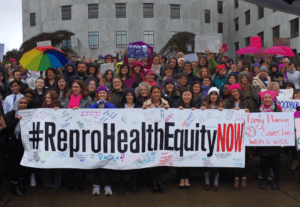Want to Slow Global Climate Change? Don’t Have Kids, Study Suggests.
Lund University researchers also noticed how people's attitudes about climate change influenced their emotional responses to their findings. VinothChandar (CC BY 2.0)
VinothChandar (CC BY 2.0)
According to a new study from Lund University in Sweden, having fewer children is among the top way to reduce climate change.
NPR helpfully breaks down the Lund researchers’ results:
The study concludes that four high-impact ways to reduce CO2 gas emissions include having fewer children, living without a car, avoiding airplane travel and eating a vegetarian diet.
By the numbers, any of these lifestyle changes drastically reduces carbon emissions compared to more common practices like recycling, using energy-efficient light bulbs and line-drying clothes.
• having one fewer child (an average for developed countries of 58.6 metric ton CO2-equivalent (tCO2e) emission reductions per year; • living car-free (2.4 tCO2e saved per year); • avoiding airplane travel (1.6 tCO2e saved per round trip trans-Atlantic flight); and • eating a plant-based diet (0.8 tCO2e saved per year).
The study’s co-author Kimberly Nicholas told NPR: “Something really important we found is that most government recommendations weren’t really talking about what makes the biggest difference, and they weren’t qualifying how big of a difference it made.” Nicholas characterized the decision to become a parent as “really personal” and said that people’s differing attitudes toward climate change informed their take on the study’s conclusions. “If they don’t believe or don’t know the science, I feel like it makes them angry. I think if they do know the science and are overwhelmed by it, they feel guilt or despair,” she said, alluding to the phenomenon known as “climate trauma.”
The Lund researchers claim their end goal in this effort was partly to educate adolescents. “They still have the freedom to make large behavioural choices that will structure the rest of their lives,” the study says, “and must grow up accustomed to a lifestyle that approaches the 2.1 tonnes per person annual emissions budget necessary by 2050 to meet the 2°C climate target.”
Nicholas also told NPR that those potential parents who are aware of the science of climate change and yet still decide to have children could be seen as helpfully optimistic. “Having a child in that case is a vote of hope,” she says. “It’s a vote that the world is going to be a better place and we can actually tackle this challenge.”
Ethicists believe it is also worth considering what a policy or campaign to have fewer children could look like. Philosopher Travis Rieder of the Berman Institute of Bioethics at Johns Hopkins told Foreign Policy:
Procreative rights policy is very scary because it involves the possibility of coercion, and we have a history rife with coercion and with violating people’s procreative autonomy when considering family planning policies. The one that people almost certainly bring up is China’s one-child policy, which was recently relaxed. It led to forced sterilization and forced abortion — all kinds of massive human rights violations.
… One option is preference adjusting campaigns — using well-understood marketing techniques, in addition to persuasive techniques, could have a really significant impact on public opinion and choices.
Rebecca Kukla of the Kennedy Institute of Ethics at Georgetown elaborated on the gender issues of advocating for people around the world to have fewer children:
Your support matters…But there is an almost unquestioned assumption that it’s a woman’s job to manage reproduction, so if we want people to have smaller families, it’s a woman’s job to do less reproducing. Why shouldn’t we be empowering men to make better reproductive decisions? Pretty much every aspect of monitoring reproduction ends up falling on women’s bodies, and what that’s actually going to mean is putting pressure on women to have smaller families and disciplining and surveilling women in yet new ways if they don’t. So it’s hard for me to imagine policies that wouldn’t turn out to disproportionately burden women. The incredibly sad irony is that poor women are also the ones who have less sexual autonomy and less ability to actually fully control when they are and aren’t reproducing. They’re the ones who are going to be held responsible, and they’re also the ones who are least in a position to live up to these norms. Wealthy, white, normative, traditional-looking families are going to get more of a pass.
Independent journalism is under threat and overshadowed by heavily funded mainstream media.
You can help level the playing field. Become a member.
Your tax-deductible contribution keeps us digging beneath the headlines to give you thought-provoking, investigative reporting and analysis that unearths what's really happening- without compromise.
Give today to support our courageous, independent journalists.






You need to be a supporter to comment.
There are currently no responses to this article.
Be the first to respond.